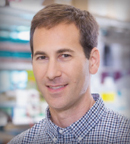
Scott M. Welford, PhD
Scott M. Welford, PhD, Professor and Biology Division Chief in Radiation Oncology at Sylvester Comprehensive Cancer Center at the University of Miami Miller School of Medicine, will lead the center’s Tumor Biology Research Program with Wael El-Rifai, MD, PhD, Associate Director of Basic Science at Sylvester and the John and Judy Schulte Senior Endowed Chair in Cancer Research.
“Dr. Welford works closely with both basic science and clinical investigators to understand the biology of cancer and develop new therapies that will lead to better clinical outcomes. His excellence in translational research is founded on strong basic science discoveries,” Dr. El-Rifai said.
Connecting Lab and Clinic
A cancer biologist by training, Dr. Welford completed a postdoctoral fellowship in radiation oncology at Stanford University and started a career as a cancer center faculty member about 15 years ago at Case Western Reserve University School of Medicine, where he said he gravitated toward translational cancer biology.
“My move to Sylvester’s clinical department of radiation oncology in 2017 gave me a great advantage as a cancer biologist to interact with clinicians and get clinical samples,” Dr. Welford said. “The challenge in basic research has always been to bridge the divide between what we do in the lab and what they do in the clinic. Sylvester has given us the chance to bridge that gap….”
Sylvester’s Tumor Biology Research Program is one of four highly collaborative, multidisciplinary research programs at Sylvester organized by scientific themes, which stem from the cancer center’s strengths and priorities, as well as prevalent malignancies within South Florida’s culturally diverse population. The program focuses on cellular interactions of tumors. This includes defining and understanding mechanisms underlying tumor initiation and progression, determining how inflammation and immunity influence tumorigenesis and the tumor microenvironment, and identifying and validating biological and molecular-based therapeutic approaches to cancer.

